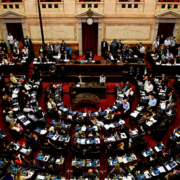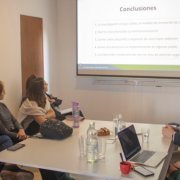The Superior Court of Justice reviews the judgment of the Chamber and grants our request to access public information
On April 17, the Superior Court of Justice ruled in favor of a cassation appeal filed by Fundeps and Fundación Ciudadanos 365, through which they questioned the Chamber’s decision to reject the amparos for delay in accessing information. and for containing a limited conception of public information.
“Below, we offer a google translate version of the original article in Spanish. This translation may not be accurate but serves as a general presentation of the article. For more accurate information, please switch to the Spanish version of the website. In addition, feel free to directly contact in English the person mentioned at the bottom of this article with regards to this topic”.
The case
In 2010, the Administrative Appeals Chamber of the Second Nomination of Córdoba rejected nine appeals lodged by the organizations because of the failure to provide public information by various departments of the provincial Executive Power.
On that occasion, the foundations had submitted several requests for public information to the Executive Power of the province and the municipalities of Córdoba and Carlos Paz on finances and public procurement (contracting, bidding and funds of small boxes of the provincial Ministries). None of the requests was answered with the information requested nor were the legal deadlines met, so judicial safeguards were carried out due to default of the Administration in the terms of art. 8 Provincial Law 8803 on Right to Access to Knowledge of State Acts.
Said injunctions were rejected by the Chamber, with fundamentals that do not arise from the text or the spirit of Law 8803, and that even incur in the grounds for a ruling that contradicts previous decisions of the same Chamber. These foundations restricted the Right of Access to Public Information widely recognized by the Provincial, National Constitution and by the Inter-American System for the Protection of Human Rights.
On the one hand, the ruling contained a totally restrictive interpretation of the concept of “public information”, limiting it to that information linked to a specific administrative act that has already been dictated. In addition, it established that citizens could only control the management of public funds through the Legislature and the Court of Auditors, thus cutting off the space for active participation of citizens through a restricted conception of democracy. On the other hand, it omitted to carry out an analysis of the content of the information provided by the State, to verify whether it is “truthful, complete, adequate and timely” with respect to the information requested. Finally, it imposed the costs of the process on the information requester, making the judicial recourse used to access public information expensive.
To challenge this ruling, Fundeps and Fundación Ciudadanos 365 filed an appeal for cassation.
The judgment of the Superior Court of Justice
To begin with, the Superior Court recognizes the active legitimacy of the amparista organizations, adopting a broad notion of the right to information contemplated in local legislation (Law 8803) and in accordance with the provisions of the international treaties on human rights with constitutional hierarchy (cf. Arts 19, Universal Declaration of Human Rights, 13.1, American Convention on Human Rights; 19.1, International Covenant on Civil and Political Rights, III, Inter-American Convention against Corruption and 13.1, Convention on the Rights of the Child). In short, it states that “the human right of access to public information must be analyzed from a broad and holistic point of view” and that “this right belongs to every person without having to show any interest or special legal status, receiving a broad legitimacy which includes both the action in administrative headquarters and in court. ” (Considering No. 14)
On the other hand, the judgment establishes that the individualization of an administrative act linked to the requested information is not necessary, since it does not arise as a requirement neither from the letter nor from the spirit of Law 8803. According to the Inter-American Court, a budget The basic principle of a democratic society is that all information held by the State is presumed to be public, accessible and subject to a limited regime of exceptions. (Considering No. 15)
Regarding the existence of legal limits to access information, the Court understands that “the causes that the Administration can evoke to refuse to provide information are truly exceptional and exhaustive, so that only those expressly provided by the Legislator can be admitted.” Therefore, if there is no exception exception explicitly stipulated in the legislation, “the principle according to which all information held by the State is presumed to be public, in order to guarantee access to data, control, is operative. citizenship and democratic participation.”(Considering No. 16)
Next, the judgment establishes that the lack of clarification of the presentation formulated at the time of requesting the information does not justify the refusal of the administration not to provide the information it has. Even when part of that required information finds limitations tending to avoid that sensitive information is provided about private and public persons in the power of the State, that is, limitations established to protect the confidentiality of the protected data and prevent the aggravation of third parties through access indiscriminate to the specific bases. Even in those cases, the Administration must inform about all the points that are not closed, that is, it must provide the information required in a partial manner (Considering No. 17).
We regret that this process has been extended for 9 years and that only now is guaranteed access to public information that we requested almost a decade ago. This situation draws attention to the standards and the way in which Law 8803 on the Right to Access to Knowledge is implemented to State acts. The Supreme Court uses standards both from the National Law on Access to Public Information and recommendations from human rights committees, which favors access to information. However, there are important aspects of provincial law that could be strengthened as well as public administration practices that should facilitate access to public information.
We celebrate that we have been guaranteed the right to access public information and the recognition by the Court that the State has a positive obligation to give the information that it has in its possession to its citizens. We understand that only through access to public information is it possible to exercise true citizen control of public administration and in the key of transparency.
Contact
Mayca Balaguer, maycabalaguer@fundeps.org






